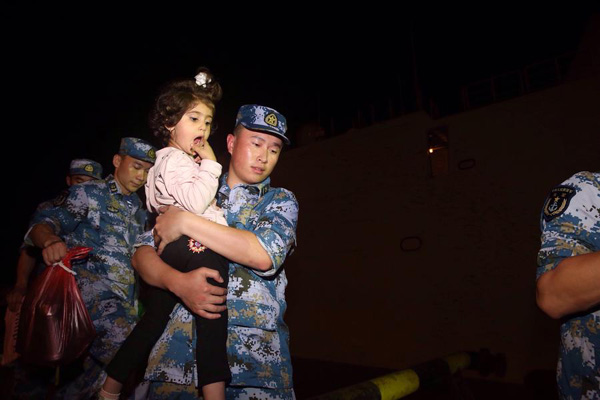China has the ability to protect its citizens overseas: Opinion
By Yi Minghai (chinadaily.com.cn) Updated: 2016-01-19 10:22
 |
|
Members of China's Linyi missile frigate help foreign nationals evacuate from Yemen and arrive in Djibouti, April 2, 2015. [Photo/Xinhua] |
As China projects its growing influence globally in terms of economy, politics and culture, increasing numbers of Chinese have gone out of the country – in 2015 alone more than 120 million tourists went overseas.
At the same time, the new challenges of protecting its citizens have been posed for the government and last year witnessed rampant terrorism, escalating conflicts in hotspots and frequent natural disasters.
Against this background, the Chinese government last year handled close to 60,000 cases involving citizens, including those affected in the civil war in Yemen, the earthquake in Nepal, the Boston Marathon bomb attack, the Asiana Airlines air crash and the terrorist attacks in Paris.
Evacuation of Chinese people from Yemen is one of the cases in which Chinese government showed its ability to protect citizens overseas.
With the conflicts in Yemen escalating in 2015, the Chinese government dispatched a warship to the Gulf of Aden to evacuate people. It's the first time a warship was used to evacuate Chinese people overseas.
During the mission, the Chinese warship not only took 613 Chinese people to safety, but also evacuated 225 people from 10 other countries, including Pakistan, Ethiopia, Singapore and Italy. The move was widely praised as a demonstration of humanitarian spirit.
After the 8.1-magnitude earthquake hit Nepal on April 25, the Chinese government expressed concerns and participated in the rescue operation. The Embassy of the People's Republic of China in the Federal Democratic Republic of Nepal contacted the Chinese citizens in Nepal, while negotiating with the airlines such as Air China, China Southern Airlines, the Civil Aviation Authority of Nepal and Kathmandu's Tribhuvan International Airport to open green channels for Chinese citizens in Nepal. 5,685 Chinese citizens stranded in Kathmandu's airport safely returned to their homes by 10 planes. China's rescue endeavor makes the rescued persons deeply moved and let the overseas Chinese citizens realize the motherland is always ready to help them out of a crisis.
The government's protection of overseas Chinese citizens showcases China accepts the responsibility a world power should bear, while highlighting the government's sense of responsibility, which plays an active role in promoting the country's development. Protecting the rights of overseas Chinese is the government's must-do responsibility. What the government did wins support from the overseas Chinese citizens, greatly enhancing national cohesion, stimulating all Chinese citizens to be patriotic and laying a constructive basis for realizing the Chinese dream. Policies and measures about protecting overseas Chinese citizens made and introduced by the government and the successful application of these polices and measures show the government's decision to protect overseas Chinese citizens and also an improvement of its governance.
Besides protecting overseas Chinese citizens, the government also extends hands to countries in crisis while respecting the countries' national interests. The government actively rescues persons without bias, reflecting a responsibility and duty a major country like China should bear.
Moreover, China has pursued the principle of peaceful relations with foreign countries since ancient times. Based on the principle, the government insists morality and justice matter most in cooperation among countries, meaning countries should seek legitimate interests and achieve win-win results in the international cooperation on the basis of inclusion, humanity, morality and justice.
The government's endeavors in protecting overseas Chinese citizens contributes to building a harmonious international order, and promotes the idea of a community of common destiny advocated by China.
The author is a professor and head of International Organization Research Center in the Communication University of China. The opinion of the writer doesn't represent that of China Daily.






